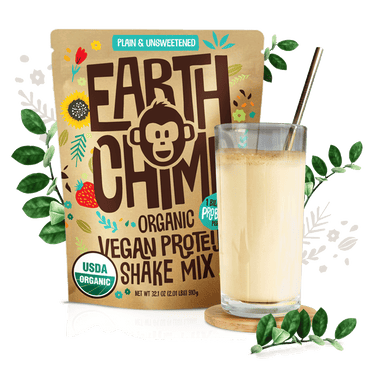Hey there! Have you ever wondered, "can vegan protein powder make you bloated?" You're in good company. As plant-based diets gain steam, it's natural to question how these powders play with our tummies. They're very convenient for adding protein, but it's true, not everyone's stomach reacts the same way.
No need to fret, though! We're providing some helpful tips to help you navigate the world of vegan protein powders. Every body is unique, and finding your perfect protein match can make all the difference. Whether it's a certain ingredient or just the way your body vibes, we've got the lowdown on how to keep bloating at bay.
Ready to dive in? We're here to guide you through choosing the best vegan protein powder for your happy, bloat-free belly. Let the journey begin!
Navigating the World of Plant-Based Protein Powder and Tummy Troubles
Embracing the vegan lifestyle? Plant-based proteins are a fantastic pick for those following a vegan or vegetarian path or just aiming to boost their protein intake. But sometimes, your tummy might not be in sync, leading to some bloating and gas. Let's delve into this and figure out how you can enjoy your protein-packed drinks without the bloat.
Plant Proteins and Your Digestive Process
Switching to vegan protein powders can be like introducing something new to your diet – it takes a bit of getting used to. Many vegan protein powders use plant-based proteins like pea, hemp, or rice protein. Your body needs a moment to adjust. During this time, you might feel a bit of bloating and gas.
Each plant protein interacts with your digestion in its own way. For example, pea protein might lead to a bit of a tummy puff. On the flip side, hemp protein is often a smoother move for your digestion. The important thing is to discover what aligns best with your body's needs and preferences.
These protein powders contain loads of fiber – great for your health but also a known factor that can contribute to bloating. This happens because a sudden fiber boost can produce gas as your body adapts. The key is to ease into it, allowing your body to slowly get in tune with the new protein source.
Ingredients to Watch: Potential Tummy Troublemakers for Some
In the world of vegan protein powders, certain ingredients might not sit well with your digestive system, leading to bloating and other discomforts. Let's explore some of these ingredients you might prefer to avoid in your protein powder:
- Soy Protein: A popular plant-based protein source that contains oligosaccharides, tricky for your body to digest, and can cause bloating and gas.
- Thickeners (Xanthan Gum, Carrageenan): They make your protein shake creamier but can also cause bloating, especially in larger amounts.
- Maltodextrin: A carb that can hang around in your gut and lead to gas and bloating.
- Inulin: A fiber that's great as a prebiotic but can also cause bloating if your body's not used to it.
- Artificial Add-ons (Flavors, Colors, Sweeteners like Sucralose): These extras might look and taste good but can upset your stomach, leading to bloating.
- Sugar Alcohols (Erythritol): Not fully absorbed, they may ferment in your gut, causing that bloated feeling.
- Gluten: For some, even a trace can lead to bloating and gas.
- Lectins: Present in certain plant proteins, they can be a bit tough for your body to break down.
If your tummy feels off after your protein shake, choosing a powder with fewer of these potential troublemakers might just do the trick. Always remember, we're all a bit different, and finding a protein powder that jives well with your unique body is key to keeping your digestion on track and feeling great.
How to Keep Bloating at Bay with Vegan Protein Powder

Picking Your Perfect Plant Protein
When it comes to choosing a vegan protein powder, it's all about finding what works for you. Different proteins interact uniquely with each digestive system. You might discover pea protein agrees with you, or perhaps hemp protein suits you better for a gentler experience. It's like a taste test for your tummy. Vegan protein powders contain a variety of sources, so there's plenty to choose from.
Notice how you feel after each protein shake. Paying attention to this will help you identify the protein choice that makes you feel your best.
Managing Your Portions Properly
It's not just what you shake up, it's also how much. Too much protein powder in one go can lead to a bloating encore, and we're not about that life. Distribute your protein intake evenly throughout the day, which helps your digestive system function well.
And don't forget about the rest of your meal plan. Combining your protein powder with various foods ensures a balanced diet.
Prebiotics: The Digestive Partners
Combining vegan protein powder with prebiotics is an excellent way to support your gut health. Prebiotics are excellent allies of the good bacteria in your belly. Include prebiotic-rich foods like bananas or onions in your meals to support your digestion effectively.
Incorporating a range of nutrients with your vegan protein powder means you're not just preparing a shake; you're promoting a balanced digestive system. This combination can help reduce bloating and enhance your overall digestive well-being. So, go ahead and enjoy your shake, confident that you're making choices that are beneficial for your body's requirements.
How Can I Choose the Right Vegan Protein Powder for Me?
Finding the right vegan protein powder can be a bit of a puzzle, but it's super important for feeling good and staying healthy. Let's walk through some simple steps to help you choose the best one for you.
Check the ingredients
Take a good look at that label because some protein powders might lead to a bit of digestive discomfort. Watch out for ingredients like maltodextrin or artificial sweeteners – known for triggering bloating in some people. Avoiding these can help maintain a comfortable stomach and minimize bloating.
Know what your body likes and doesn't like
If your tummy has a no-fly list for certain ingredients, like soy protein or other additives, listen to that. After all, using vegan protein shouldn't be a recipe for discomfort. Many plant-based protein sources are gentle on the stomach, but it's all about finding what works for you. Remember, your body's feedback is precious – it tells you what's a hit and what's a miss.
Keep it simple
A shorter ingredient list often means fewer chances of stumbling upon those ingredients that may cause a fuss in your tummy. And when it comes to quality, aim for the stars. High-quality, organic, non-GMO vegan protein powders are not just a fantastic source of protein; they're also more likely to be kind to your digestive system.
Go for quality
Choose vegan protein powders that are organic and non-GMO. These are generally better for you and less likely to have icky additives. Good quality powders not only help you meet your protein needs but also take care of your overall health, including your gut.
When you're picking a vegan protein powder, think about these tips to make sure you're getting one that fits your needs and keeps your body feeling great.
Wrapping It Up: Your Journey to the Perfect Vegan Protein Powder

In the end, vegan protein powders are a fantastic way to get your nutrition, especially if you're all about that plant-based life. But it's super important to pick one that your body loves to avoid any tummy troubles. Understanding what's in the powder and how your body reacts to different plant proteins can really make a difference.
If you're hunting for a vegan protein powder that checks all the boxes, why not try EarthChimp? This organic vegan protein powder is a mix of pea, pumpkin, sunflower, and coconut proteins, making it a unique choice with no artificial flavorings. This makes it a great option if you're watching out for additives that might lead to bloating. Plus, EarthChimp steers clear of added erythritol, added sugars, dairy, lactose, gums, and gluten.
Remember, the right vegan protein powder can make your meals better without any discomfort. Always pay attention to how your body feels and pick a powder that fits your eating habits and lifestyle.
FAQs: Getting to Know Your Vegan Protein Powder
Is it harder to digest vegan protein powder than other kinds?
For some folks, vegan protein powder can be a bit tricky to digest, especially if it's made from plant proteins like soy. This might lead to some bloating or tummy troubles. But hey, many people actually find vegan protein powders easier on the stomach, especially if they have trouble with lactose.
Can vegan protein powder give you diarrhea?
It's not the norm, but it can happen. If you're consuming vegan protein powder and notice any digestive discomfort, it's important to note that it might be your body's way of adjusting. Always listen to your gut!
Can all protein powders cause bloating?
Not necessarily, but it's something to be aware of. Whether it's vegan protein powder or another type, bloating after consuming is possible due to certain ingredients like artificial sweeteners or proteins that are tough for some to digest.
What stuff in protein powders might make you gassy or bloated?
Keep an eye out for common ingredients likely to cause digestive issues, including bloating. Artificial sweeteners and some thickeners can be the culprits. Remember, plant-based powders often have alternative protein sources that might be easier on the belly.
Is whey protein known to upset stomachs?
For some, yes, especially if lactose is a no-go zone. Whey can lead to bloating and other digestive issues. Vegan protein powder, on the other hand, offers a lactose-free option, often making it a friendlier choice for gut health.
References:
- https://www.healthline.com/nutrition/xanthan-gum - “Xanthan Gum — Is This Food Additive Healthy or Harmful?”
- https://www.healthline.com/nutrition/erythritol - “Erythritol — Like Sugar Without the Calories?”
- https://www.ncbi.nlm.nih.gov/pmc/articles/PMC7073751/ - “Nutritional Status and the Influence of the Vegan Diet on the Gut Microbiota and Human Health”
Disclaimer:
This statement has not been evaluated by the Food and Drug Administration. This product is not intended to diagnose, treat, cure, or prevent any disease.















